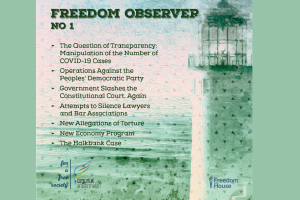From Editor-in-Chief
An important topic on last week’s political agenda was the MHP’s appeal to the IYI Party for cooperation or alliance in the upcoming local elections. Despite the fact that the IYI Party has not yet issued an official response to the MHP’s proposal, initial indicators suggest that it may decline such collaboration and amalgamation with the MHP. This is especially true if the MHP’s proposal implied such a merger, as it appears that the IYI Party intends to uphold its autonomy.
In reality, Akşener seems to have had a broader political objective right from the outset, surpassing mere reconciliation with the MHP. Although the chances of this objective coming to fruition are slim, Akşener’s ultimate aspiration is to position herself within the center-right, rather than aligning solely with the nationalist faction of the political spectrum. Her intermittent remarks such as “my aim is to become the prime minister, and I will achieve it” and her hesitancy within the opposition alliance on the brink of the May elections can only be comprehended within this context.
It’s worth noting that Akşener’s hesitations might have been influenced by the “Millet Alliance’s” failure to adopt a clear stance against the HDP. In this regard, the recent statement from the Eskişehir Provincial Chairman of the IYI Party, a few days ago, that “Mr. Kemal Kılıçdaroğlu’s ambiguous rapprochement with the HDP was not well-received by our intended audience” isn’t just his personal view but also resonates with the overall sentiment within the Party.
In a highly contentious political maneuver, the government has taken steps to facilitate the release of tens of thousands of ordinary criminals from prisons through amendments to the Criminal Execution Code. Essentially, this constitutes a covert amnesty initiative, as elaborated below. Just three years ago, the government employed a similar strategy, leading to the liberation of approximately 100,000 individuals. Evidently, the motive behind this move by the AKP government is to create space for new inmates within the already overcrowded correctional facilities. In fact, even with the previous releases, there are still around 350,000 convicts and detainees incarcerated today.
However, the significant extent of this issue largely stems from the AKP government’s actions. There are two primary factors contributing to this situation: Firstly, numerous offenses within our legal framework are categorized as alleged offenses against the State. Those found guilty of these “crimes against the State,” which often encompass the exercise of civil and political rights – fundamental avenues for democratic citizen involvement – are systematically excluded from such execution or amnesty initiatives. The second factor pertains to court proceedings that frequently transgress the principles of a just trial. In essence, numerous individuals are needlessly incarcerated due to unfair trials.Hence, the approach to avert the incarceration of hundreds of thousands of citizens entails reducing politically motivated offenses within the criminal code to the lowest feasible extent. Moreover, it necessitates ensuring that political offenders – who are purported to have engaged in acts classified as crimes against the State – aren’t exempt from amnesty. Instead, they should be prioritized for release. Concurrently, it’s imperative to rigorously adhere to the stipulations of international human rights conventions to which Turkey is a signatory and to uphold the principles of a fair trial as outlined by the existing Constitution in criminal proceedings.
However, the matter of navigating through the economic crisis, a responsibility seemingly bestowed upon Mehmet Şimşek, the Minister of Treasury and Finance, and H. Gaye Erkan, the Governor of the Central Bank, hasn’t yielded considerable positive strides thus far. Furthermore, as previously highlighted, nearly no actions have been taken to curtail public expenditures. Surprisingly, the weight of the economic “recovery” program, which remains uncertain in terms of its continuity post-local elections and its potential for success, is being imposed on the shoulders of the civilian sector. This imposition, notably impacting those with modest and middle incomes, is being executed through tax hikes and price escalations.
Lastly, let’s delve into a few aspects highlighted by the latest declaration put forth by the National Security Council (MGK). Historically, MGK gatherings and the ensuing communiqués held immense significance in the eyes of nearly everyone, particularly politicians and the media. In recent years, although the tradition of the NSC releasing public declarations has endured, both the meetings themselves and the statements made have ceased to captivate as much public interest as in the past. While this shift represents a positive development, the Council’s agenda and declarations remain an essential information source for those seeking comprehensive insights into Turkey’s “State” and its ongoing core concerns.
Viewing the latest NSC Communiqué dated August 9th from this perspective, certain aspects stand out prominently: Even seven years after the July 15 coup attempt, whose underlying motives and intricate dynamics remain partially concealed, the Republic of Turkey continues to designate the Gülen sect, labeled as “FETÖ,” as its principal adversary. This perspective clarifies the paradox wherein the AKP, a party that emphasizes state authority, has been releasing numerous ordinary criminals from correctional facilities, while simultaneously apprehending Gülen sympathizers through routine police operations. Thousands of individuals from diverse professions and backgrounds, spanning all age groups and health conditions, are being imprisoned without differentiation between children and adults, elderly and young, women and men, ill and healthy individuals.
Additionally, it would be remiss not to underscore a further irony embedded within the NSC Declaration. Specifically, the MGK Communiqué, chaired by AKP leader Tayyip Erdoğan in his role as President, endorses and upholds the Treaty of Lausanne. Curiously, this endorsement contrasts with the perspective held by the AKP’s constituency – and possibly the broader political elite – which perceives the Treaty as a “betrayal document” that constricts Turkey’s actions and potential!
See you in the next Freedom Observer!
* Prof. Dr. Mustafa Erdoğan
Unequal Execution Regulations Deepen Injustice
Concurrent with the erosion of the rule of law, Turkey’s criminal justice system is increasingly entangled in a web of issues. Prisons are grappling with overcrowding primarily stemming from “political trials,” where the foundational tenets of a fair trial are being blatantly disregarded. Despite the release of hundreds of thousands of individuals due to amendments in execution regulations and pandemic-related permits, the prison population persists at approximately 350,000 convicts and detainees, significantly surpassing capacity limits. This level of overpopulation inherently leads to substantial human rights violations. Moreover, there are supplementary challenges arising from the incarceration of the sick, elderly, and juvenile offenders within these correctional facilities.
One can contend that the surge in prison overcrowding can be attributed to the leniency with which decisions on detention and convictions are rendered in what are termed “political cases” – situations where the state, rather than private individuals, is perceived as the direct victim. This challenge, denoted as the unpredictable and sweeping interpretation of terrorism legislation, has been consistently highlighted by numerous international observers and organizations. In fact, one of the stipulations set forth for Turkey under the European Union’s visa liberalization agreement is the clarification of the definition of terrorism.
The prosecution and penalization of actions unrelated to violence, aligning more with the exercise of freedoms pertaining to expression, assembly, and association within the framework of terrorism offenses, generates a multifaceted dilemma within the realm of the rule of law.
Nonetheless, it appears that the government’s approach to addressing prison-related issues is not primarily centered around rectifying the previously discussed challenges of equitable trial proceedings and safeguarding fundamental rights. Rather, the emphasis seems to be on releasing ordinary criminals through amendments to the execution laws.
In fact, as an illustration, the year 2020 witnessed Law No. 7242 introducing substantial changes to Execution Law No. 5275. Among these amendments, the rate of conditional release for conventional offenses was diminished from 2/3 to ½. Additionally, the law incorporated a provisional Provisional Article 9, revising the conditions for probation and conditional release concerning actions committed before March 30, 2020. This clandestine amnesty led to the immediate release of approximately 100 thousand individuals.
Conversely, in response to the Covid-19 pandemic, a permit system was introduced for individuals in open prisons and those eligible for such placement, envisaging their transition to probationary status. However, it’s noteworthy that these regulations excluded crimes against the state and terrorist offenses from their purview.
Through the enactment of the “Omnibus Law” No. 7456, which marked one of the inaugural legislations following the May 2023 elections, a revision in execution and a concealed amnesty were introduced. Accordingly, the addition of Provisional Article 10 to Law No. 5275 extended the validity of the Covid-19 pandemic permit. Additionally, the sixth paragraph of the same law brought about alterations in the eligibility criteria for individuals incarcerated on or before July 31, 2023, allowing them to be transferred to open penal execution institutions, as well as enabling their access to probation and conditional release.
Effectively starting from July 31, 2023, this regulation encompasses convicts within penal execution facilities who have spent a minimum of one month there if their cumulative sentence of imprisonment is below 10 years, and three months if the cumulative sentence surpasses 10 years. Furthermore, individuals who have three years or less remaining before their release to open penal execution institutions are encompassed by this directive. However, it’s important to note that these amendments exclude crimes against the state and terrorist offenses from their coverage.
The formulation and the extent of this regulation give rise to significant concerns. Foremost, the regulation presents attributes of a specific amnesty, substantively, and has been implemented without adhering to the 3/5 majority requirement typically associated with amnesty laws. Furthermore, the law’s applicability deadline is poised to generate noteworthy complications: A segment of individuals who committed analogous offenses on identical dates will stand to gain from this directive due to the finalization of their sentences, while others will not be able to capitalize on it as their cases remain unresolved. Undoubtedly, this engenders overt disparities.Most importantly, political prisoners are again excluded.
Consequently, these enactments have inadvertently generated a form of impunity for conventional offenses. Individuals found guilty of offenses like manslaughter, looting, theft, and sexual assault will reap the advantages presented by these regulations and ultimately secure their release. In stark contrast, those who have been convicted of affiliations with terrorist organizations or involvement in other state-related crimes, often merely due to the exercise of their constitutionally enshrined freedoms of expression, association, and assembly as dissidents, will persist in confinement. These asymmetrical provisions further exacerbate and intensify the existing injustices prevalent within the framework of the criminal justice system.
* Ali Rıza Çoban – Constitutional Lawyer
RTÜK Continues to Impose Program Suspension Penalties on Opposition Television Channels
The Radio and Television Supreme Council (RTÜK) continues its repressive and punitive measures against opposition media outlets. During its customary weekly session centered on monitoring cases, RTÜK rendered three instances of program suspension and imposed a three percent administrative penalty on TELE1 and KRT. KRT’s penalty was attributed to the language employed in the “Haftanın Panorama” program, where references to the HDP and Kurdish voters were deemed in violation of broadcasting standards, specifically those governing “the inseparable unity of the state with its land and people.” Meanwhile, Tele1’s “Forum Weekend” program allegedly contained content that denigrated headscarves and belittled families enrolled in Quran courses. Consequently, the channel was penalized for pursuing a broadcasting approach that was “antithetical to national and ethical values.”4
In the lead-up to the May 2023 elections, we have periodically highlighted within this Bulletin the measures enacted by the government to instill fear and assert control over opposition media outlets. Evident from RTÜK’s consecutive resolutions subsequent to the elections, the media sector stands as a realm where the government has displayed the utmost assertiveness against opposition entities. Both the Chairman’s stance and the Board’s determinations lean toward penalizing opposition channels whenever a chance arises. Nevertheless, this approach not only curtails the freedom of expression and information but also contributes to Turkey’s descent in international press freedom rankings.
Conversely, while the government exhibited inklings of reverting to “rational policies” and conventional economics following the elections, it persistently clings to its former repressive tactics concerning freedom of expression, information, and the right to assembly and demonstration. The government’s assumption that it can reconcile these diametrically opposed strategies rests on an unfounded illusion. This scenario underscores that the government’s approach to democracy and development lacks a comprehensive perspective, as it predominantly pursues policies tailored to elongating its political tenure.
However, it’s imperative to acknowledge that within an environment where journalists are gripped by the specter of arrest, media outlets are coerced into prioritizing political over market relations, and experience pressure from both ruling and opposition factions (as exemplified in the CHP’s intricate rapport and schism with Halk TV), “rational policies” are incapable of attaining the desired objective. The coexistence of authoritarian governance and liberal economics has only found success in a handful of nations, while in numerous countries, including Turkey, the former has tended to expand at the expense of the latter. If the government’s aspiration is to elevate Turkey into a prosperous state, it must recognize that selective rational policies will not suffice. A comprehensive approach to rights and freedoms is imperative.
* Ömer Faruk Şen – Ph.D. – Missouri University
Will the Burden of Public Savings Fall on the Shoulders of the Consumer?
Upon assuming the role from his predecessor Nurettin Nebati, Treasury and Finance Minister Mehmet Şimşek’s initial pronouncements resonated with the public and market participants alike, signaling a pivot towards a more pragmatic approach in economic policies. While these declarations were interpreted by the public as an implicit acknowledgment that prior economic policies, particularly those steered by Nebati and Berat Albayrak, were lacking rationality, it became necessary to undertake tangible actions to substantiate Şimşek’s commitment to rationality. The emergence of a new phase in Turkey’s economic landscape, under the leadership of Mehmet Şimşek, infused optimism that appointments would be grounded in merit and that pragmatic policies would be promptly implemented, akin to the developments surrounding the appointment of Central Bank Governor Hafize Gaye Erkan.
Indeed, the recent interest rate hike determinations made by the new economic team distinctly signal the abandonment of the longstanding notion that “interest rates are the cause, and inflation is the effect.” This paradigm had previously posed a significant impediment to ushering in rationality within the economy. Furthermore, both Mehmet Şimşek and Gaye Erkan have consistently emphasized that the central objective of Turkey’s novel economic approach is the curbing of inflation. In line with this objective, not only monetary measures such as interest rate hikes are being pursued, but also fiscal discipline within the public sector is being enforced.
However, the public perception created by the term “savings” has raised the question of whether these policies will primarily target government institutions or citizens, given the connotation of austerity associated with it. In fact, one of the initial steps taken by Mehmet Şimşek’s economic team has been to raise various indirect taxes, particularly the Special Consumption Tax. It’s evident that the hikes in indirect taxes are aimed at consumers. Similarly, recognizing that the Special Consumption Tax functions as a negative externality tax and encompasses goods and services with limited price elasticity, it can be acknowledged that raising taxes on these products is a potentially “favorable” way to address the fiscal deficit generated through public sector savings.
While Mehmet Şimşek has emphasized that these tax hikes won’t be a recurrent practice, speculations about potential new tax increases often circulate on social media. Nonetheless, any such measures should be executed in a manner that mitigates the weight of austerity policies on citizens. Notably, this approach does not encompass escalating indirect taxes.
Çağın T. Eroğlu – Coordinator, Freedom Research Association
1 https://www.sozcu.com.tr/2023/gundem/tutuklu-ve-hukumlu-sayisinda-yeni-rekor-7566559/
2 https://www.mfa.gov.tr/soru-cevap.tr.mfa
3 https://www.bbc.com/turkce/haberler-turkiye-52269724
4https://www.sondakika.com/haber/haber-rtuk-tele1-ve-krt-ye-program-durdurma-cezasi-verdi-16211060/





